Row, row, row your boat / across the open sea…
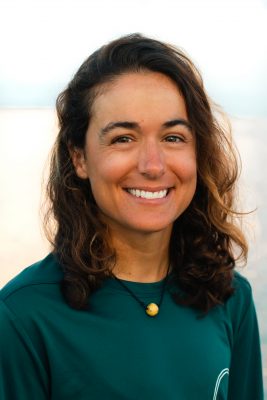
Lauren Shea
©Lindsey Hawkin Stigleman
That was Lauren Shea’s first thought on seeing teams in their rowboats coming into English Harbour, Antigua, after their trans-Atlantic trek.
The UBC Institute for the Oceans and Fisheries Master’s student learned about the Talisker Whisky Atlantic Challenge while working as Chief Mate aboard a sailing school ship in Antigua. “I talked to a fellow crew member and thought “that sounds awful”, she said. However, after spending the first year of the pandemic sailing around the Atlantic she became less skeptical.
“Everyone was gathered in the harbour, boats were parading in, ships were blowing their horns and setting off flares, as a team of men came in on their rowing boat, and I turned to the people beside me and said I’m going to do this. I’m going to make an all-women’s team, and raise money for ocean conservation.”
She sent messages to Noelle Helder, a fellow student from her undergraduate program at the University of South Florida, and Chantale Bégin, who had been one of their instructors at the university, asking if they were interested, and then carried on with her day.
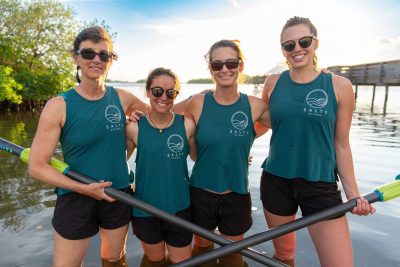
Salty Science team (l to r): Isabelle Côté, Lauren Shea, Chantale Bégin, and Noelle Helder
©Lindsey Hawkin Stigleman
The hard work began
They spent most of 2022 finding sponsors and raising funds to cover registration costs, purchasing the boat (nicknamed Emma), and preparing for the 40 to 60-day trek from the Canary Islands, off the coast of northwest Africa, to Antigua in the Caribbean. “We have to be self-sufficient. We‘ll live 24 hours a day on that boat for the duration of the trip with no support boat.”
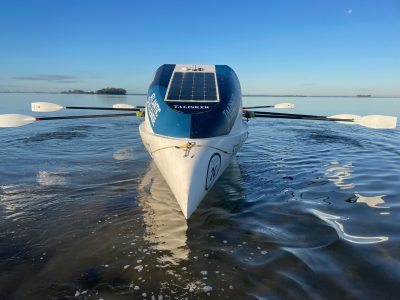
Salty Science’s rowboat, Emma
©Salty Science
It will be an arduous trip. Not only are there challenges with coastal navigation, “there is also the risk of rough weather in the open ocean. I’ve experienced it sailing, but in an open, 28-foot rowboat? The boat is self-righting, so if it capsizes it will roll back over. Every team prepares to capsize at some point and you can deploy various tools to slow yourself down and decrease this risk, but really it comes down to training for what you would do, and hoping for the best,” said Shea.
And the team has been training. None of the team were rowers, Shea noted, and even so ocean rowing is much different than flat water or indoor rowing. Early on, they found a physical trainer and rowing specialist who has been essential for their physical and mental preparation. The team has been training on land and on sea for eighteen months now, including night sessions, and plans to do trips around the Florida coast, where the boat is currently based, and hopefully multi-day trips this summer.
“We are four women. We are four marine biologists, we are three academic generations, and we are very aware that we are acting as role models.”
“Once we set off, the plan is for each team member to spend two hours rowing and two hours off. It is not much time to sleep, but cumulatively, we hope to get enough sleep. We also plan to eat at least 4,000 calories a day, most of it dehydrated, high-calorie meals donated by generous sponsors,” Shea said. “And yes, we’ve also done a lot of team-building as well; we are going to be alone together on a 28 foot boat, 24 hours a day for almost 2 months. We’ve discussed what it looks like when you’re not having a good time and how you want your team mates to approach you in those situations. We’re preparing the best we can.”
Supporting ocean conservation
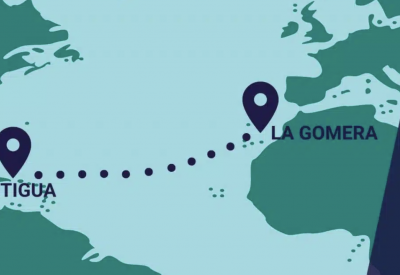
Race route
©Salty Science
Dr. Isabelle Côté highlighted the three organizations the team selected. “GreenWave is focused on ocean sustainability, training people to do integrated aquaculture, developing ecosystems that are really sustainable, and empowering people in impoverished regions. Shellback is a small non-governmental organization that trains undergraduate students to collect data underwater and then connects them with Eastern Caribbean governments that need the information.
“The third one is very close to my heart, which is British Columbia’s Bamfield Marine Science Centre, which is in my opinion, one of the best field stations on the West Coast. It is life-changing for students who attend. Often the students – from K-12 to university – have had little experience with the ocean, and they learn, and when they learn they start caring. But there is a financial barrier for many, and we are working to raise funds to ensure a broader group of experiences for students.”
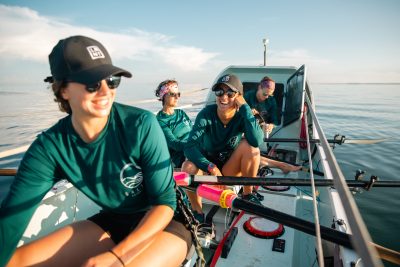
Salty Science
©Lindsey Hawkin Stigleman
Shea agrees, “I’m excited because my team is made up of a pretty remarkable group of people. We may not break any records, but we have an opportunity to do the challenge, raise money, and generate a platform for underrepresented groups in marine conservation.”
Shea notes that the team has a lot to do before the race start in December 2023. “We’ve been training intensely, taking courses, planning, strategizing, and fundraising for more than 2 years, and still have a lot of do. Then there is the race. And then after the race, well, we’ll be exhausted and need to rest, but we’ve been joking that we’ll immediately sign up for something even bigger next. I hear they are putting together a similar race in the Pacific,” she mused.
Support Salty Science
The Salty Science team is looking for your support! There are various ways to donate: starting by a simple donation, sponsoring one of the 5,000 kilometres they must cover, offering in-kind sponsorship and corporate sponsors. More information about the race and how to donate is available at https://saltyscience.org/.
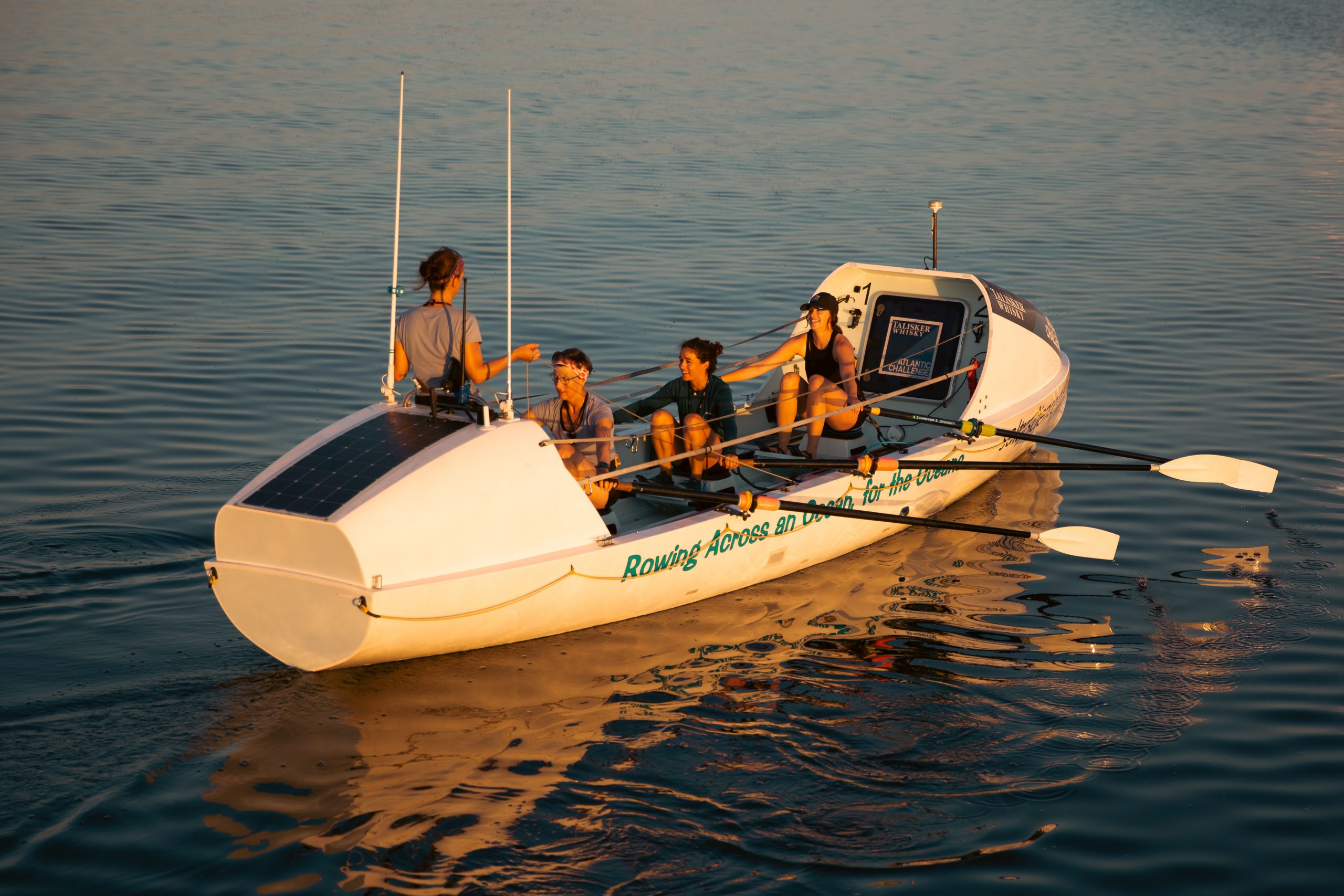
©Lindsey Hawkin Stigleman
Tags: Atlantic, conservation, crowdfunding, International Day of Women and Girls In Science, IOF students, ocean, rowboat, team